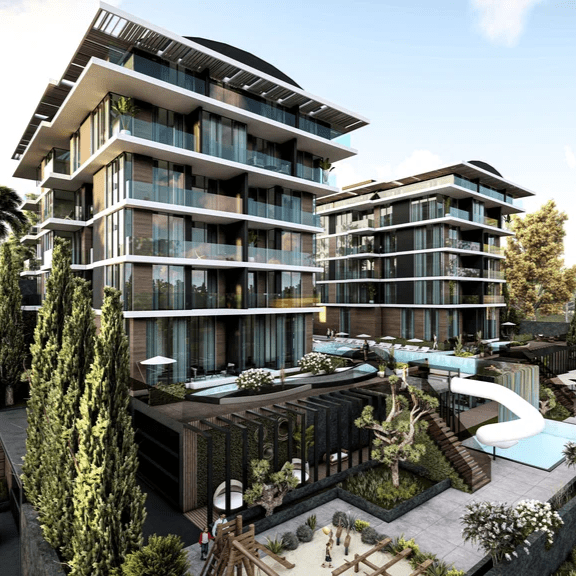Whether Turkey is good for expats? About 35,000 expats from the UK are already living in Turkey — the British move here for the warm maritime climate, affordable real estate, high-quality healthcare and food, and the friendliness and hospitality of the locals. Some people go to Turkey to work, live, and raise children, others buy fabulous holiday homes that they could never afford in their own country and spend a happy retirement in them. What is essential to know about expat life in Turkey? Here is what you need to know about how to move to Turkey from the UK, and what you keep in mind before taking this step.
Atmosphere, Climate, and Lifestyle
What is the main advantage of living in Turkey? The main attraction for British expats in Turkey is the warm Mediterranean climate — the resort of Antalya enjoys 280 sunny days a year, and the average annual temperature is +19.6 °C. For comparison, in London there are 134 sunny days a year and the average annual temperature barely goes above +10°C.
According to the Human Development Index, Turkey is one of the top 50 countries in the world, with large cities such as Istanbul, Ankara, Izmir, Antalya or Mersin having a quality of life comparable, and sometimes even superior to, some British and European cities.
What are other reasons for brits living in Turkey? The country can boast clean Blue Flag beaches (there are more than 500 in Turkey), world-class resort infrastructure, the mesmerising beauty of the mountains, well-developed transport infrastructure, affordable travel around the country, and organic locally harvested food. British expats call life in Turkey an “eternal holiday,” noting that they do not spend a lot of time commuting to work and have the opportunity to spend every weekend at the seaside or on exciting trips around the surrounding area.
The hospitality of the locals is another advantage of moving to Turkey. What is an attitude to british expats in Turkey? Foreigners are treated in a very friendly way here and the largest cities have long been multicultural. Many Turks, especially young people, are quite fluent in English.
Antalya. Photo: ArthurHidden (Freepik)
British Communities and Cultural Life
The largest British expat communities in Turkey are concentrated in Istanbul, Izmir, and Ankara. How do british expats live in Istanbul? The Brits particularly favour Istanbul due to its status as Turkey's commercial capital, the abundance of international schools and universities, tennis courts, football fields, and other world-class sports facilities.
There are many British Turks here — those who have returned to their homeland, Brits who are married to locals, employees of British and multinational corporations, as well as English retirees who moved for the warm climate and service. You can meet compatriots to travel, play sports or attend cultural events together through communities on social media or on the InterNations website designed for the community of British immigrants.
An important factor that allows a Brit to feel comfortable in Turkey is the rich cultural life. So living in Turkey as an expat you can enjoy the numerous cultural events. In Istanbul, you can visit the opera and ballet theatre, while Ankara is the base for Turkey’s Presidential Symphony Orchestra that performs throughout the country. Every major city has museums and galleries of modern and classical art and offers music and theatre festivals and shows. The country keeps its ancient monuments and natural landmarks in excellent condition to welcome tourists.
This resort country's proximity to Europe and inexpensive direct flights mean that British expats don't feel detached from the rest of the world: they can easily travel to the Venice Carnival in Italy, theatre events in Prague, exhibitions at the National Gallery in London or contemporary art festivals in Berlin.
On top of that, the British, especially those who have lived in Turkey long enough or have moved to retire, may find the social norms and restrictions here less strict than those in the UK, which is definitely an advantage.
Ankara. Photo: ekrem (Pixabay)
Prices, Education, and Healthcare
What about prices for expatriates in Turkey? According to Numbeo, a service that collects data on the prices of goods and services around the world, the cost of living in Istanbul is 53.4% lower than in London, and rent is 74% more affordable.
For instance, a lunch at a café in London costs about $24.31 (£20) per person, and in Istanbul, it is three times cheaper, $7.21 (200 liras). A dinner for two at a British restaurant would cost you at least $97.25 (£80), while a similar meal at a restaurant in Turkey would cost a third of this amount — $32.45 (900 liras).
Groceries in Istanbul are 46% cheaper, and British expats specifically emphasise that in Turkey, food is both cheaper and tastier. The Turkish government subsidises local producers of vegetables, fruits, eggs, cereals, and dairy products. As a result, tomatoes are 73.4% more affordable in local supermarkets, milk is 38%, white bread – 70%, eggs – 56% cheaper. So, life in Istanbul for foreigners seems to be cheaper and better.
A comfortable life for a family of four in Turkey would require on average about $2000 (54,200 liras) per month, excluding rent, and $540 (15,100 liras) will be enough for one person. In London, a family would need $4530 (£3708) and a single person would have to spend $1319 (£1079).
Is Turkey a good country to live from an economic point of view? One thing you should keep in mind is that the Turkish economy is experiencing severe hyperinflation of the national currency. It is about 60% at the time of writing, and in 2022 it reached 85%. Therefore, the purchasing power of local residents who earn income in lira is 68% lower than that of UK residents.
The average salary in London after taxes is $3397, in Istanbul it is 82.3% lower, making it $602. It is more lucrative for expats to work for international corporations or earn income in England and live in Turkey. For one, the average pension in the UK is £700 or $855, which is 40% higher than the average salary in Istanbul.
In addition, there is a double taxation treaty between the UK and Turkey, so a British expat does not need to pay Turkish tax on income earned in their home country.
What about moving to Turkey from the UK with children? Public schools and kindergartens in Turkey are free, but lessons are taught in Turkish. The monthly cost of a child being in a private kindergarten starts at $388 (10,808 liras), an academic year at an international school would start at $10,054 (279,900 liras).
What should an expat know about healthcare in Turkey? The healthcare system in Turkey is multi-level and includes a network of pre-insurance medicine centres with family doctors, as well as clinics, hospitals, and ambulances. Insurance for one person costs an average of $72 (2000 liras) per year. After obtaining a residence permit, expats living in Turkey need to register through the Ministry of Health's E-nabiz website to benefit from medical services.
Istanbul. Photo: Philip Bird (vecteezy.com)
Renting and Buying Real Estate
What are the other reasons for moving to Turkey from the UK? Another thing that attracts the British to Turkey is the spacious and affordable housing.
The average size of a flat in London is only 60 square metres, townhouses are 64 square metres, detached houses are 147 square metres. Renting a one-bedroom flat in the centre costs about $2600 (£2128) per month, on the outskirts, it is $1888 (£1546) per month. A three-bedroom family home costs between $3110 (£2544) and $5000 (£4100), depending on the location, plus you need to pay extra for utilities. Combined with mobile communications and the Internet, they cost about $448 (£367).
As of 2022, only 53% of Londoners own their own property, and the average budget for buying a small flat is $351,763 (£228,000). A Londoner typically spends between 30% and 50% of their salary on rent, and residential compounds are apartment buildings with small yards and minimal services.
Developers in Turkey are actively developing condominiums for foreigners, with swimming pools in common areas, zones for yoga and recreation, playgrounds, and a lobby where you can hold a work meeting or sit down with your laptop. A typical family flat here is about 110 square metres, with three bedrooms, a spacious kitchen-living room, plus a terrace, balcony, or patio. Studios for a couple or a single person usually have an area of about 40 to 50 square metres. They often have a balcony, a terrace or a mini patio.
How do the British expats live in Istanbul, Turkey? Renting a one-bedroom flat in a nice area of Istanbul costs about $1000 (28,000 liras) per month, a three-bedroom flat costs $1320 (36,569 liras). For living cheaper in Turkey an expat should pay attention outskirts and suburbs. Outside the centre, housing can be rented for $800 (22,300 liras). Utility bills cost approximately $80 (2220 liras) per month.
You can buy a flat in Turkey with a budget of $50,000, and a house from $130,000, depending on the city and region. When purchasing a property worth $75,000 or more in Istanbul or another large city, a foreigner stands to receive a Turkish residence permit (ikamet) and investing in real estate from $400,000 can get you citizenship without having to take a test in the Turkish language. To see a selection of flats and villas for expats in Istanbul built by trusted developers, check out the Housearch listings.
What is another advantage of living in Istanbul as an expat? The opportunity to buy a relatively inexpensive holiday home or villa in Turkey often comes in handy for British retirees: houses here are 20% to 50% cheaper than in the UK, and as a rule these are more spacious and modern properties. So, for instance, in the UK, retirees dreaming of living by the sea with a budget of $350,000 can purchase a small townhouse of about 70 square metres in a fishing village. Moving to Turkey, for the same amount you can buy a house with an area of about 150 square metres with a swimming pool, within walking distance from a clean beach.
New buildings in Turkey
Visa, Residence Permit, and Jobs in Turkey
UK citizens can travel to Turkey without a visa and stay for up to 90 days in any 180-day period. This does not require any special documents — a valid passport would suffice. The border guards will put a stamp that marks the beginning of your stay in the country. You should remember, however, that when crossing the border, your passport should be valid for another six months.
How can i live in Turkey for a longer period? Brits who want to settle in Turkey permanently should apply for a residence permit. It makes transportation and mobile communications cheaper, it’s more convenient to travel around the country, you can use local public healthcare facilities and send your children to public schools.
What about residency permit in Turkey for British? A residence permit is issued for many reasons. It can be obtained by tourists who have signed a long-term rental agreement for a flat, foreigners who have bought real estate here for their own residence or opened a business, as well as investors and students. A family residence permit is issued to the spouse and children of a Turkish citizen or expat who already has any type of ikamet except a student one.
You must apply for an ikamet on your own after you’ve come to Turkey. Before doing this, you need to rent or buy housing in particular areas. The recent influx of foreigners has forced Turkish authorities to limit the issuance of residence permits in certain areas to control the percentage of expats. Is living in Istanbul for expats still possible? You can find out which areas are available for ikamet on the government website or in the municipality of interest. The standard package of documents for a residence permit includes a valid travel passport, a rental agreement or TAPU (certificate of ownership of real estate), medical insurance, and a certificate from your bank confirming the fact that there is money in your account.
A work visa in Turkey is equivalent to a residence permit — it is issued through the employing company, and the expat’s financial support is a contract with a specified salary. Once the foreigner gets their ikamet, their family can apply for one, too.
In a Nutshell
All in all, is Turkey a good place to live and work? Turkey is home to quite a large British community. The hospitality and openness of the local residents help to smooth the adaptation process for those moving to Turkey from the UK.
Real estate, food, and entertainment pricing in Turkey is notably lower than in the UK. However, the unstable local currency makes working for a local company quite a risky prospect. UK citizens who have a steady income in their homeland or work for a multinational corporation can provide a higher quality of life for themselves in Turkey. The country’s slow-paced lifestyle and warm climate make it the perfect place to spend your retirement.
Cover photo: Bandırma, Balıkesir, Turkey. Ozgur Kara (Unsplash)







